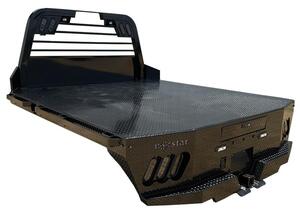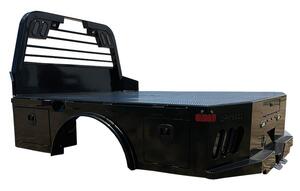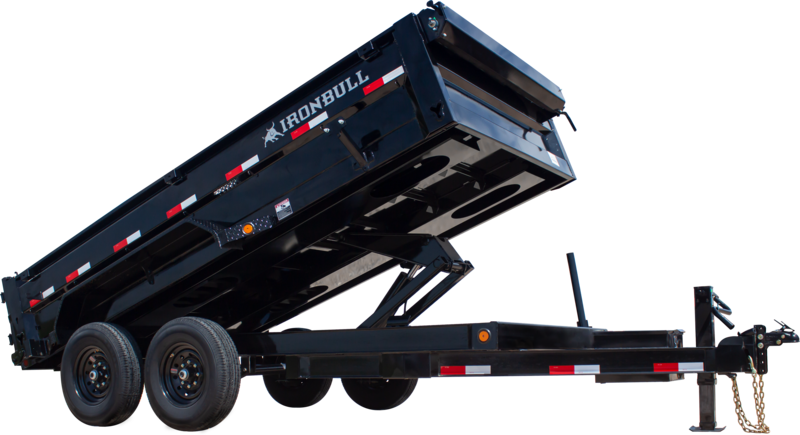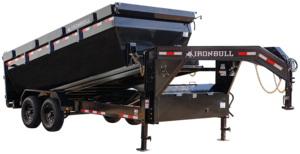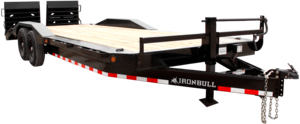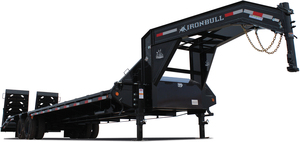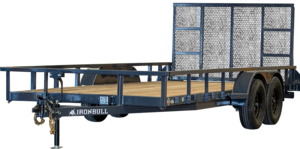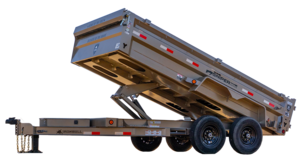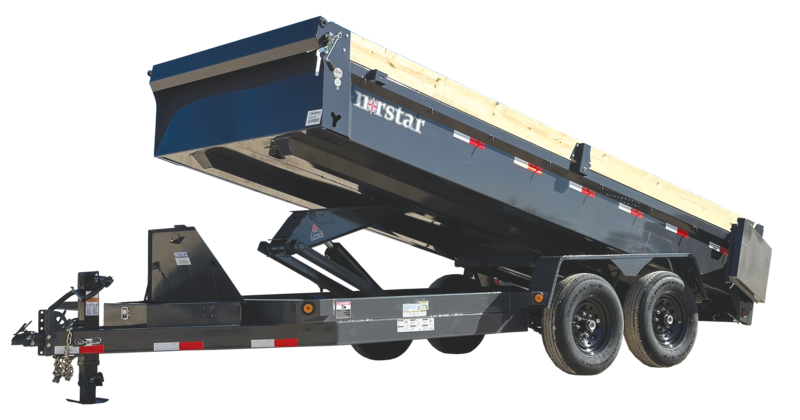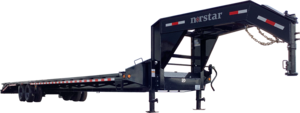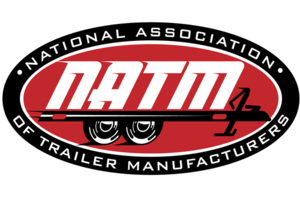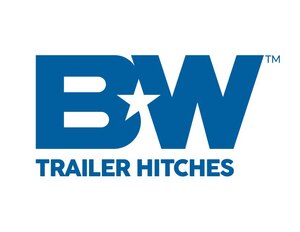Double Axle Vs Single Axle Trailer: What to Choose?

Are you looking to level up your towing experience? Start with choosing the best type of trailer for your needs–double axle or single axle?
From enhanced stability and weight distribution to maneuverability and cost considerations, both options significantly impact your towing requirements.
Here’s a breakdown of the essential factors that can influence your decision.
Whether you're a seasoned hauler or a first-time trailer owner, understanding each configuration will empower you to make the right choice for your specific needs.
The Importance Of Choosing The Correct Type Of Trailer
Selecting the right type of trailer is a decision that directly impacts your hauling efficiency and safety.
Weight Distribution and Stability
Proper weight distribution is crucial for stability during towing. Double axle trailers offer superior weight distribution, reducing the risk of swaying and enhancing overall stability on the road.
Single axle trailers, while simpler, may experience more pronounced weight imbalances, affecting stability during turns and sudden maneuvers.
Maneuverability and Tight Spaces
The type of trailer you choose directly affects your ability to navigate through tight spaces.
Single axle trailers are more maneuverable, making them suitable for confined areas and sharp turns. Double axle trailers, though less nimble, provide added stability, which is advantageous on long highway stretches.
Cost Considerations and Maintenance
Cost is a significant factor in the trailer selection process. Single axle trailers are generally more cost-effective upfront and incur lower maintenance expenses.
On the other hand, double axle trailers may have a higher initial cost but offer long-term benefits through reduced wear and tear on individual components. Thus, it leads to lower maintenance costs over time.
What are Single Axle Trailers?

Single axle trailers are hauling equipment that have only one set of wheels. It provides a straightforward design with unique advantages and considerations.
Pros of Single Axle Trailers
- Maneuverability: Single axle trailers are highly maneuverable. They are ideal for navigating through tight spaces, urban areas, and challenging terrains. Their compact design allows for easier handling and parking.
- Lower Initial Cost: Single axle trailers are generally more budget-friendly upfront, making them an attractive option for individuals or businesses looking for a cost-effective hauling solution without compromising functionality.
- Ease of Maintenance: With fewer components, single axle trailers often require less maintenance. This simplicity can reduce upkeep costs over time. In short, they are practical choice for those seeking a hassle-free towing experience.
Cons of Single Axle Trailers
- Limited Load Capacity: Single axle trailers have a lower load capacity compared to their double axle counterparts. This limitation can affect their suitability for hauling heavier loads. You need to have careful consideration of cargo weight.
- Stability Challenges: While maneuverable, single axle trailers may experience stability challenges. This is highly needed at higher speeds. Swaying and fishtailing can occur, needing cautious driving practices to maintain control on the road.
- Uneven Weight Distribution: The single axle design may result in uneven weight distribution, especially with irregularly shaped or heavy loads. You’ll observe its impact on towing stability and can even increase the risk of issues like fishtailing.
Ideal Uses For Single Axle Trailers
- Home and Garden Tasks: Single axle trailers are well-suited for light-duty tasks such as transporting landscaping materials, gardening supplies, and small equipment around residential areas.
- Recreational Hauling: Ideal for towing smaller boats, motorcycles, or camping gear, single axle trailers are popular among recreational enthusiasts who require a compact and versatile hauling solution.
- Local Deliveries and Small Businesses: Businesses involved in local deliveries or small-scale operations often find single axle trailers economical. They are practical for transporting goods within a limited radius, where maneuverability is very crucial.
What are Double Axle Trailers?
Double axle trailers, distinguished by their two sets of wheels, offer enhanced stability and load-bearing capabilities.
Pros of Double Axle Trailers
- Superior Stability: Double axle trailers provide increased stability during towing. They minimize swaying and improving control, especially at higher speeds. This enhanced stability makes them well-suited for long-distance hauling and highway travel.
- Higher Load Capacity: With the extra set of wheels distributing the weight, double axle trailers can handle heavier loads more effectively than single axle trailers. They are a preferred choice for transporting substantial cargo or equipment.
- Reduced Wear and Tear: The load is distributed across four wheels, resulting in less strain on individual components. There is reduced wear and tear on tires, axles, and other parts, ultimately extending the trailer's lifespan and lowering long-term maintenance costs.
Cons of Double Axle Trailers
- Cost: Double axle trailers typically come with a higher upfront cost compared to single axle trailers. The initial investment can deter budget-conscious individuals or businesses, requiring careful consideration of the long-term benefits.
- Reduced Maneuverability: While stable, double axle trailers are less maneuverable than their single axle counterparts. Tight turns and navigating through confined spaces can be more challenging. They are less suitable for urban or crowded areas.
- Increased Maintenance Complexity: The additional components and complexity of a double axle system may require more maintenance. If you own one, you should be prepared for potentially higher upkeep costs and a more demanding maintenance routine compared to single axle trailers.
Ideal Uses For Double Axle Trailers
- Long-Distance Hauling: Double axle trailers are well-suited for transporting goods over long distances on highways, providing the stability and load capacity necessary for safe and efficient travel.
- Heavy Equipment Transport: Businesses involved in construction, agriculture, or other industries requiring the movement of heavy equipment often opt for double axle trailers due to their robust load-bearing capabilities.
- Commercial and Industrial Applications: Double axle trailers find widespread use in commercial settings where stability and load capacity are highly important, such as hauling tools, machinery, or goods for industrial purposes.
Comparison: Single vs. Double Axle Trailer

When it comes to choosing between single and double axle trailers, various factors come into play. Let’s break down the key aspects, including cost, maintenance, ease of use, weight limits, and more, to help you make an informed choice for your specific hauling needs.
Cost
- Single Axle Trailers: Typically more budget-friendly upfront, making them a cost-effective choice for those with initial budget constraints.
- Double Axle Trailers: These come with a higher initial cost but may offer long-term cost benefits through reduced maintenance and increased durability.
Maintenance
- Single Axle Trailers: Generally simpler in design, requiring less maintenance. Ideal for those seeking a hassle-free towing experience with minimal upkeep.
- Double Axle Trailers: Can be more complex, potentially requiring additional maintenance. However, the distribution of weight may result in reduced wear on individual components over time.
Ease of Use
- Single Axle Trailers: Highly maneuverable, making them suitable for navigating tight spaces and urban areas. Ideal for those who prioritize ease of handling.
- Double Axle Trailers: Offer superior stability at higher speeds but are less maneuverable. Well-suited for long-distance hauling on highways.
Weight Limit
- Single Axle Trailers: Have a lower load capacity compared to double axle trailers. Suitable for light to moderate hauling tasks.
- Double Axle Trailers: Can handle heavier loads more effectively. They are a preferred choice for transporting substantial cargo or equipment.
Stability
- Single Axle Trailers: They may experience stability challenges, especially at higher speeds. Requires careful driving practices to maintain control.
- Double Axle Trailers: Provide superior stability. They minimize swaying and ensure better control during towing.
Ideal Applications
- Single Axle Trailers: Well-suited for home and garden tasks, recreational hauling, and local deliveries in confined areas.
- Double Axle Trailers: Ideal for long-distance hauling, heavy equipment transport, and commercial or industrial applications where stability and load capacity are needed.
How to Choose: Single or Double Axle Trailer

Here's a guide to help you in the decision-making process and choose between a single or double axle trailer based on your specific needs.
- Payload Requirements. Consider the weight and volume of the cargo you plan to haul. If you anticipate transporting heavier loads regularly, a double axle trailer may be more suitable due to its higher load capacity.
- Budget Constraints. Evaluate your budget for both the initial purchase and long-term maintenance. Single axle trailers are generally more budget-friendly upfront, while double axle trailers may offer cost savings over time through reduced wear and tear.
- Intended Use and Terrain. Assess the environments you'll be navigating. Single axle trailers are maneuverable and suitable for tight spaces, urban areas, and off-road terrains. Double axle trailers, with their stability, are better suited for highways and long-distance travel.
- Frequency of Use. Consider how often you'll be using the trailer. For occasional or light-duty tasks, a single axle trailer may suffice. If you plan on frequent or heavy-duty use, the enhanced durability and stability of a double axle trailer might be more advantageous.
- Towing Vehicle Capacity. Check the towing capacity of your vehicle. Ensure that the trailer you choose aligns with your vehicle's towing capabilities to maintain safe and efficient towing.
- Maneuverability vs. Stability. Assess your preference between maneuverability and stability. If you prioritize ease of handling in confined spaces, a single axle trailer is preferable. For enhanced stability, especially at higher speeds, a double axle trailer is more suitable.
- Long-Term Investment. Consider the long-term benefits and potential cost savings. While a double axle trailer may have a higher initial cost, it could offer reduced maintenance expenses over time, making it a more economical choice in the long run.
- Industry or Task-Specific Requirements. Evaluate any industry or task-specific requirements. For example, specific industries, such as construction or agriculture, may benefit more from the load capacity and stability offered by double axle trailers.
Making the Right Choice for Your Hauling Needs
In selecting the perfect trailer for your hauling requirements, the decision between a single or double axle trailer plays a pivotal role. Each option comes with its own set of advantages and considerations, requiring a thoughtful assessment of your specific needs.
If you need expert advise, consider turning to Norstar Company, a reputable company known for our quality trailers. Norstar offers a diverse range of both single and double axle trailers, providing options that cater to various hauling demands.
Reach out to our knowledgeable team at Norstar to receive personalized guidance tailored to your unique requirements. Our specialists are dedicated to helping you make an informed decision, ensuring that your chosen trailer meets both your immediate needs and long-term expectations.
At Norstar, we are not just providing trailers; we deliver solutions that empower you to tow confidently. Visit us today!





